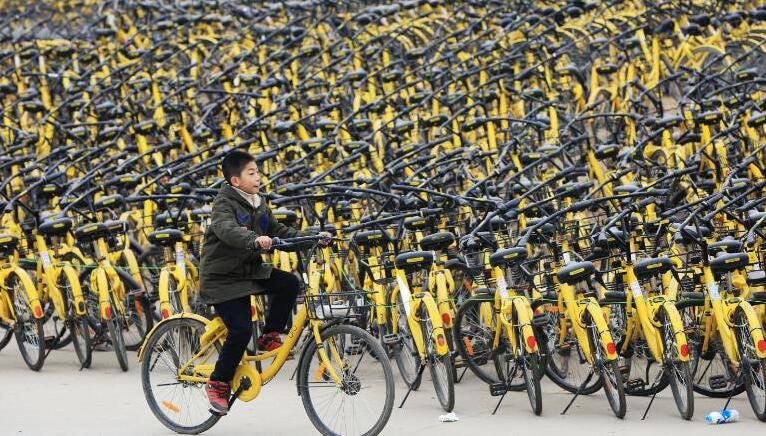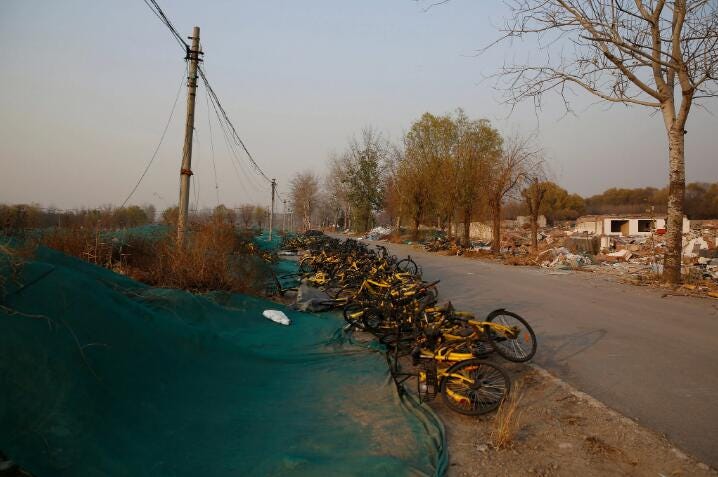Founded in 2014 as a university project, Ofo has managed to garner a long list of powerful backers. It raised another $866 million from investors led by Chinese e-commerce giant Alibaba in March, but didn’t disclose an updated valuation at the time.
Earlier this year, there were also reports of a joint buyout offer for Ofo offered by Alibaba affiliate Ant Financial and Chinese ride-sharing giant Didi Chuxing, which has invested $350 million in the startup to date. Alibaba didn’t respond to an emailed request for comment. Industry watchers expected Ofo to be acquired by its big ride-hailing backer, Didi Chuxing, the company that drove Uber out of China. But that never happened. Instead, Didi snapped up another bike-sharing company, Bluegogo. “When Didi suddenly bought Bluegogo and launched their own bike-sharing service, that was a red flag,” Towson said. “That’s like when your wife tells you she’s starting to date again.” A Didi spokeswoman declined to comment, referring instead to an earlier response sent to local economic journal Caijing. The company said at the time it had never considered acquiring Ofo, and would support its independent operation.
BEIJING — Brilliantly simple, emission-free solution to the problem of urban congestion? Or the maddening height of venture-backed technology hubris?
Dockless rented bicycles swept into Chinese cities two years ago. Their arrival inspired a wave of similar mobility experiments around the world, even as city dwellers in China bemoaned the sight of candy-colored bikes heaped in unholy piles on their sidewalks.
Now, one of China’s leading bike start-ups, Ofo, is facing serious financial problems. Its founder is on a government blacklist for unpaid bills. Millions of riders who placed deposits are demanding their money back. And the business model used by many of China’s tech firms — spend furiously to acquire new users, worry about profits later — is showing its limits.
The run of Ofo customers seeking refunds appears to have started last week. Doubts about the company’s financial health had swirled for months. Just this week, hundreds of irate users have been lining up outside Ofo’s Beijing headquarters to demand refunds of their deposits. Users had initially been asked to pay a 99 yuan ($14.3) deposit before unlocking Ofo bikes, and then the amount was later raised to 199 yuan ($29). They can request a refund through the Ofo app, but it stipulates a waiting period of 15 days. And some users have been complaining on social media that they can’t get their money back even after the waiting period expires, which they put down to rent Ofo’s bumblebee-yellow bikes. (The company’s Chinese nickname translates as “Little Yellow Bike.”)
But according to state media, one user posted on the social platform Weibo last week that he had quickly gotten a refund after writing an email to Ofo — in English.
The post touched off outrage about the apparent differences in the way the company was treating Chinese people and foreigners. It also set off a rush among other Ofo users seeking refunds.
“Ofo’s user base is large, so there is a possibility that the number of applications for deposit refunds will soar,” the company said late Monday in a statement posted on Weibo. “Please be patient. We promise that deposits will be refunded according to the proper procedures. To all users, please don’t worry!”
The statement appears only to have made people worry more.
Many customers used the Ofo app to apply for refunds and joined a queue that had climbed to nearly 12 million people by Thursday.
In an email to employees on Wednesday, Ofo’s founder, Dai Wei, acknowledged that the company had been under financial strain all year.
“I thought countless times about cutting operating capital to pay back some of users’ deposits and debts to suppliers, and even about dissolving the company and filing for bankruptcy,” Mr. Dai wrote. An Ofo spokesman did not respond to requests for comment.
Hundreds of people have also shown up at Ofo’s Beijing headquarters this week.
On Thursday, the company’s fifth-floor office was filled with police officers and shouting customers. Two women were crying.
Zhang Wei, a migrant worker, had come to the office on Monday seeking a refund and had left without it, missing a day of work in the process. Mr. Zhang, 27, showed up again Thursday morning and wound up angrily kicking an Ofo employee.
After being taken to the local police station and released, he returned to the Ofo office. He finally managed to convince an employee to transfer him the amount he had put down, around $30.
By then, he had spent a total of around $15 to travel to and from Ofo’s offices by subway and taxi. But he said it was worth it.
“It was never about the money,” he said. “I just needed to vent.”
Liu Jingyi, a student from the northern city of Xi’an, had forgotten about her Ofo deposit until she saw people talking about it on Weibo last month.
Ms. Liu, 23, said she was not optimistic that she would get her money back.
“Look at how many shared bikes there are now,” she said. “I always felt that these cash-burning business models would have to end sooner or later.”
Follow me on Twitter @Tinkleostar


